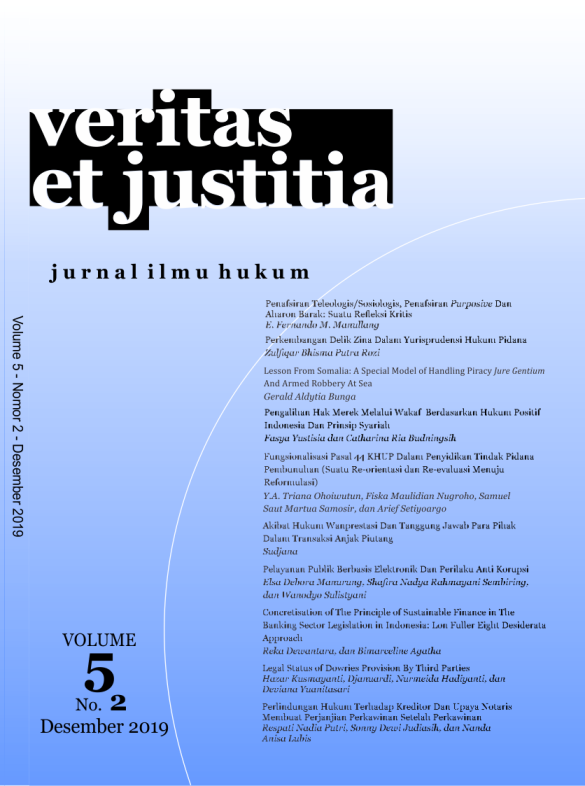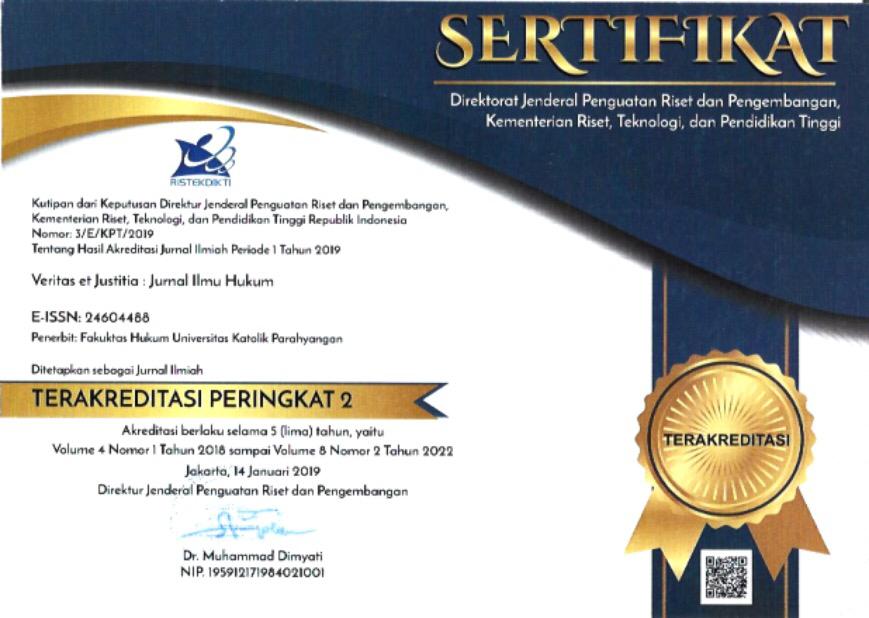PELAYANAN PUBLIK BERBASIS ELEKTRONIK DAN PERILAKU ANTI KORUPSI
DOI:
https://doi.org/10.25123/vej.v5i2.3614Abstract
Advancement in the information and communication technology make possible the development of e-government. The Indonesian government already grasped the opportunity to develop its own e-government system in providing public services. The obvious intent is to increase the quality of public service provision by the bureaucracy. This is hoped to be achieved by securing transparency and accountability of public officials. It is also to be expected that e-governance will be able to eradicate or at least decrease the possibility of corruptive behaviour. Unfortunately, fact speaks differently. Cases to be analysed here are: corruption committed by public officials working at the Investment and One Stop Service Office of the Bandung Municipality and those performed by public officials managing e-procurement services. In particular, this article shall discuss the issue how to develop e-government as to better at eradicating and preventing corruption by public officials.References
Daftar Pustaka
Buku:
A. Brueckner, E-Government: Best Practices for Digital Government, Bulletin of the American Society for Information Science and Technology, 2005.
Amiruddin, Korupsi dalam Pengadaan Barang dan Jasa, Genta Publishing, Yogyakarta, 2010.
Abu Fida’ Abdur Rafi, Terapi Penyakit Korupsi dengan Tazkiyatun (Penyucian Jiwa), Republika, Jakarta, 2006.
Andi Hamzah, Pemberantasan Korupsi Melalui Hukum Pidana Nasional dan Internasional, RajaGrafindo Persada, Jakarta, 2012.
R. Cialdini, Influence: The Psychology of Persuasion, Quill, New York, 1993.
Damsar, Pengantar Teori Sosiologi, Jakarta: Kencana, 2015.
J. Bertot, et.al, Using ICTs to create a culture of transparency: E-Government and Social Media as openness and anti-coruption tools for societies, Government Information Quarterly, 2010.
Jesper Schalaeger, E-Government in China: Technology, Power, and Local Government Reform, Routledge, New York, 2003.
Kate A. Mirandilla dan Ma. Rosel S. San Pascual, E-Government for Development: A descriptive and Exploratory Assesment of E-Government in the Philippines, Philippines, 2007.
Kementerian Pendidikan dan Kebudayan RI, Pendidikan Anti Korupsi untuk Perguruan Tinggi, Jakarta, 2017.
M. Asgarkhani, Digital Government and Its Effectiveness in Public Management Reform, Public Management review, 2005.
M. Piatkowski, Can information and communication technologies make a difference in the development of transition economies? Information Technlogies and International Development, 2006.
Maria Hartiningsih, Korupsi yang Memiskinkan, Buku Kompas, Jakarta. 2011.
Romli Atmasasmita, Korupsi, Good Governance, dan Komisi Anti Korupsi di Indonesia, Penerbit Perum Percetakan Negara Republik Indonesia, Jakarta, 2002.
S. Bhatnagar, Central Vigilance Commision Website: A Bold Anticorruption experiment, World Bank, Washington DC, 2001.
Sally S. Simpson, The Criminology of White-Collar Crime, New York: Springer, 2009.
Soerjono Soekanto dan Budi Sulistyowati, Sosiologi: Suatu Pengantar, RajaGrafindo Persada, Jakarta, 1982.
Forum:
NOIE, e-Government Benefits Study, Commonwealth of Australia, Canberra, 2003.
S. Basu, E-Government and Developing Countries: An Overview, International Review of Law Computers and Technology, 2004.
Sundstrom, Convenantas with Broken Swords: Corruption and Law Enforcement in Governance of The Commons, Global Environmental Change, 2015.
Artikel:
Amos Avny, SWOT Analysis of e-Government, Annals of University of Bucharest, Nr. 1 Economic and Administrative Series, 46, 2007.
Arjan Reurink, White Collar Crime: The Concept and Its Potential For The Analysis of Financial Crime, 573 European Journal of Sociology, 39, 2016.
Budi Setiyono, Memahami Korupsi di Daerah Pasca Desentralisasi: Belajar dari Empat Studi Kasus, 81 Politika, 39, 2017.
Citra Hennida dkk, Budaya dan Pembangunan Ekonomi di Jepang, Korea Selatan, dan Cina, 2 Global & Strategis, 255, 2010.
Dwi Prihatni Amrih Rahayu dan Dyah Setyaningrum, “Pengaruh Tata Kelola dan E-Government terhadap Korupsi”, Ekuitas: Jurnal Ekonomi dan Keuangan, 445, 2017.
Fathul Wahid, Lesson from e-Government Initiatives in Indonesia, 22 Media Informatika, 13, 21, 2004.
G. Udo, Privacy Security Concerns as Major Barriers for e-Commerce: A Survey Study, 94 Information Management & Computer Security, 165, 2001.
Igif G. Prihanto, A Comparative Study on The e-Government Development of United Nations Member States to Support The e-Government Development in Indonesia, IPTEK-KOM, 2013.
Listiyono Santoso, Dewi Meyriswati, dan Ilham Nur Alfian, Korupsi dan Mentalitas: Kendala Kultural dalam Pemberantasan Korupsi di Indonesia, Jurnal Masyarakat, Kebudayaan dan Politik, 2014.
Listiyono Santoso dan Dewi Meyrasyawati, Model Strategi Kebudayaan Dalam Pemberantasan Korupsi Di Indonesia, 51 Jurnal Review Politik, 22, 39, 2015.
Muhamad Ngafifi, Kemajuan Teknologi dan Pola Hidup Manusia dalam Perspektif Sosial Budaya, 21 Jurnal Pembangunan Pendidikan: Fondasi dan Aplikasi 41, 2014.
Titon Slamet Kurnia, et.al., E-Government dalam Penyelenggaraan Pemerintahan Daerah di Indonesia, Masalah-Masalah Hukum, 2017.
Internet:
Ashutosh Sharma, Why E Government Project Fail, http://www.intosaiitaudit.org/intoit_articles/27_p11top13.pdf, diakses pada 25 Maret, 2019.
Badan Pendapatan Daerah Provinsi Jawa Barat, E-Samsat Jawa Barat, https://bapenda.jabarprov.go.id/e-samsat-jabar/, diakses pada 12 Maret, 2019.
Data KPK 2018 Statistik Tindak Pidana Korupsi berdasarkan Jenis Perkara Jenis Perkara, https://www.kpk.go.id/id/statistik/penindakan/tpk-berdasarkan-jenis-perkara, diakses 28 Maret, 2019.
Dony Indra Ramadhan, Terungkap di Sidang, Uang Pungli Eks Kepala DPMPTSP Bandung Rp. 63,9 Juta, https://news.detik.com/berita-jawa-barat/d-3530672/terungkap-di-sidang-uang-pungli-eks-kepala-dpmptsp-bandung-rp-639-juta, diakses 25 Maret, 2019.
Heddy Yusuf, LPSE Agency Karawang Diadukan ke KPK, https://www.kompasiana.com/heddy/54f5dccaa33311191f8b47ee/lpse-agency-karawang-diadukan-ke-kpk, diakses pada 28 Maret, 2019.
Hisham Abdelsalam, dkk, Success and Failure of Local E-Government Projects: Lessons Learned from Egypt, https://pdfs.semanticscholar.org/114c/d0781d084ec48398c63a93306386dbaf7b68.pdf, diakses 25 Maret, 2019.
Nohria, N., You’re Not as Virtuous as You Think. Washington Post, [online], hlm. 1,
https://www.washingtonpost.com/opinions/youre-not-as-virtuous-as-you-think/2015/10/15/fec227c4- 66b4-11e5-9ef3- fde182507eac_story.html, 2015, diakses pada 26 Februari 2019.
Pengelola Nama Domain Internet Indonesia (Pandi), Nama Doain, https://pandi.id/statistik/ diakses 13 Maret, 2019.
Penulis artikel Hukum Online, Modus Korupsi Pengadaan, Sebelum dan Sesudah Perpres 54/2010, https://www.hukumonline.com/berita/baca/lt57723197ac42e/modus-korupsi-pengadaan--sebelum-dan-sesudah-perpres-54-2010, diakses 27 Maret, 2019.
Sutan, Ada Mafia Proyek di LPSE, https://www.suarapemredkalbar.com/berita/kalbar/2016/05/10/ada-mafia-proyek-di-lpse, diakses pada 13 Maret, 2019.
Perundang-undangan:
Undang-Undang No. 5 Tahun 2014 tentang Aparatur Sipil Negara.
Undang-Undang No. 28 Tahun 1999 tentang Penyelenggaraan Negara yang Bersih dan Bebas dari Korupsi, Kolusi, dan Nepotisme
Instruksi Presiden Republik Indonesia Nomor 3 Tahun 2003 tentang Kebijakan dan Strategi Nasional Pengembangan E-Government.
Lain-lain:
Global Centre for Public Service Excemence, From Old Public Administration to the New Public Sector Reform in Developing Countries, UNDP.
Nurdin, Benchmarking Indonesian Local e-Government, PACIS Conference in Ho Chi Minh Vietnam, paper 61.
Downloads
Published
Issue
Section
License
Authors who publish with this journal agree to the following terms:
Authors retain copyright and grant the journal right of first publication with the work simultaneously licensed under a Creative Commons Attribution License that allows others to share the work with an acknowledgement of the work's authorship and initial publication in this journal.
Authors are able to enter into separate, additional contractual arrangements for the non-exclusive distribution of the journal's published version of the work (e.g., post it to an institutional repository or publish it in a book), with an acknowledgement of its initial publication in this journal.
Authors are permitted and encouraged to post their work online (e.g., in institutional repositories or on their website) prior to and during the submission process, as it can lead to productive exchanges, as well as earlier and greater citation of published work.
The Journal allow the author(s) to hold the copyright and to retian publishing rights without restrictions.










